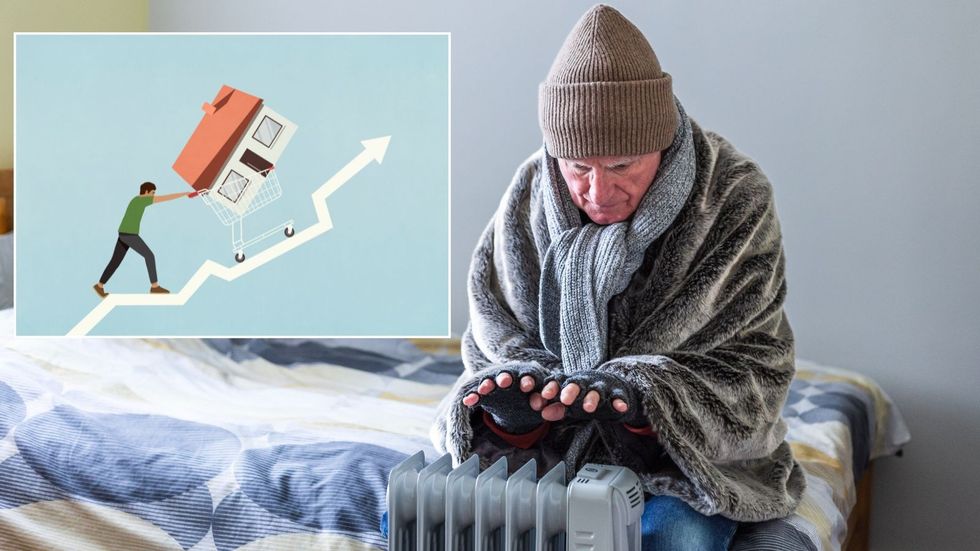Energy bill crisis forces millions to cut back on heating as 'cold homes crisis' deepens

Citizens Advice warns 4.5 million tenants struggled to keep warm last winter
Don't Miss
Most Read
Shocking new data has found that 4.5 million private tenants across England and Wales cut back on gas and electricity use last winter.
Citizens Advice is highlighting research that sugggests 41 per cent of renters restricted their energy consumption just to manage bills.
The situation has now reached "crisis" levels, with around 3.5 million people could not maintain comfortable temperatures in their homes.
Energy costs remain 50 per cent above pre-2021 levels, piling pressure on household budgets.

Many tenants resorted to desperate measures, including going without hot meals, wearing gloves indoors and heating only one room.
|GETTY
Many tenants resorted to desperate measures, including going without hot meals, wearing gloves indoors and heating only one room, Citizens Advice claims.
Most tenants live in homes that fail to meet acceptable energy standards.
Some 57 per cent of renters are in properties rated below EPC C, forcing them to spend more on heating.
Those in homes rated only at the minimum EPC E standard faced average extra costs of £317 last winter compared to tenants in C-rated properties.
Do you have a money story you’d like to share? Get in touch by emailing money@gbnews.uk.
Citizens Advice determines inefficient housing stock continues draining renters’ finances while leaving them powerless to make improvements.
The charity has also warned that substandard homes are intolerable in summer, with extreme heat compounding the issue.
Ministers are under pressure to deliver promised reforms requiring landlords to upgrade properties to EPC C by 2030.
Decisions on rental efficiency standards are due soon, but delays could leave renters trapped in cold, costly homes for years.

This imbalance leaves many tenants unable to secure basics like proper insulation or repairs to draughty windows.
| GETTYFear of retaliation adds to the problem with nearly one-third of renters avoid asking for repairs or upgrades, worried about rent rises or damaging relations with landlords.
Among the 30 per cent who have approached landlords, 13 per cent were told improvements would mean higher rent, while 7 per cent were refused outright.
This imbalance leaves many tenants unable to secure basics like proper insulation or repairs to draughty windows.
Emily Wise, an energy adviser at Citizens Advice North Lancashire, described the tough choices facing families.
"Sadly, this is an all too familiar story. Many of the renters we help day-to-day say their landlords are hesitant to fix the substandard conditions they live in," she said.
She noted that coastal communities face particular challenges: "Leaky, cold and damp housing is a huge problem in our local area, as many homes are particularly deteriorated due to salty sea air and high winds".
Ms Wise added: "Too often, this is forcing renters to spend disproportionately on gas and electricity in an attempt to achieve basic levels of comfort, as well as having to regularly choose between eating and heating their homes.
"Many of those we help are reluctant to raise these issues with their landlords because they fear putting their tenancy at risk."
Dame Clare Moriarty, the chief executive of Citizens Advice, said advisers are preparing for another surge in calls this winter.
LATEST DEVELOPMENTS:
 |
| Citizens Advice East Lancashire
"Our advisers are bracing for more calls this winter from renters trapped in cold, leaky homes," Ms Clare said.
"It's unacceptable that so many tenants are afraid to ask for the very basics – like fixing draughty doors, or replacing poor quality single-glazed windows," she added.
With the publication of these findings, Citizens Advice is demanding urgent reform.
She said: "By 2030, the government must ensure no renter lives in a home that is excessively difficult and expensive to heat. And renters must urgently be given the security they deserve so they can ask landlords to fix substandard housing without fear of retaliation."
More From GB News











